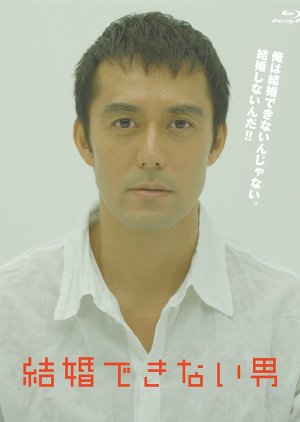
This drama is very refreshing, very well written and highly entertaining. The synopsis might not really attract you, but just watch it, you'll get drawn into the series in no time at all.
Hiroshi Abe is definitely at his BEST here! He plays Kuwano-san, an accomplished architect who is rather quirky and sarcastic and definitely not a people's person. And I gotta say... Abe did a BRILLIANT job portraying this character. His acting here is SUPERB, really. His character is a mix between Jack Nicholson in "As Good As It Gets" and Hugh Laurie of "House M.D."
It is very interesting to see how Abe's character tries to interact with other people in different kind of situations as portrayed throughout the series. I especially love the interaction between him and Ken-chan, the neighbour's dog. If you haven't seen it, I'm telling you, you'll fall in love with Ken-chan, because he is the cutest thing ever!
The actress that plays Hayasaka-san is also amazing. She's able to "balance" Abe's Kuwano and they succesfully created a perfect on-screen chemistry together.
This drama is totally a must see!
Was this review helpful to you?

The acting was clearly very good in this drama. even the younger one, kuninaka did very well with her role. not excellently but very well. Abe hiroshi was at his excellence though. clearly he was by far the best in this.
I do not remember the music but i think it complimented the scenes in a way and it fit.
Since this is not a suspence drama and such I think rewatching it would still be entertaining. I have only watched it twice though.
Was this review helpful to you?

When I read the summary, I didn't think that the drama would be this interesting or fun to watch. It was highly entertaining, light and funny (not over-the -top comedy) and it wasn't boring at all.
Abe Hiroshi did an excellent job in portraying Kuwano-san. He was able to get the perfect slouching posture and the awkward facial expressions without overdoing it.
Although Kuwano-san tends to hurt people's feelings without realising, it's not possible to actually hate him cause he has a soft side. And you can see how his character gradually develops when he interacts with people (and Ken-chan) more. I especially like the scenes where Kuwano interacts with Ken-chan...it's just too cute to watch. ^-^
I also like Natsukawa Yui's acting a lot as well. The chemistry between her character (Hayasaka-san) and Kuwano-san was brilliant. ?
I would definitely want to re-watch this drama again someday! :)
Was this review helpful to you?

This drama is great, because for me, it's different. It doesn't have your usual "doki doki" moments, your super melodramatic moments. It's lighthearted throughout.
The acting, especially the main male lead, is definitely one of the best. If nothing else, watch it for him.
Overall, it's not your typical rom-com drama. But it is well written and well acted.
Was this review helpful to you?

No doubt Abe Hiroshi is a wonderful actor. He is funny without overacting, he really WAS Kuwano Shinsuke: his slouching posture, his funny expressions. In every one of his scenes, he attracts the eye of the audience. Although it may also be because he is so tall and has such a nice figure.
Hayasaka Natsumi, as Dr. Natsukawa, was as good as Abe Hiroshi was. Both of them were amazing together, and they had a nice chemistry. I love her smile (two dimples!), she was a very simple woman in terms of clothes and haircut, but I found her lovely and very pretty. I love when she forced herself to keep smiling when Kuwano has been mean to her.
One of the reasons I decided to watch this dorama was because the plot seemed similar to "As good as it gets", one of my favorite movies. And it was in some ways, but again, completely different. Yes, Kuwano is a kind of grumpy man who does not like people. Yes, there is a dog. But that's it. Kuwano is sarcastic and tends to hurt people's feelings without meaning to, he is more sympathetic. He has OCD but not too extreme. He smiles more than Jack Nicholson's character; he socializes more too. He is likeable; so likeable that two pretty women fall for him eventually.
The dog, Ken-chan, has a minor role for 7 episodes; in Episode 8 is where they get closer. I wanted Kuwano to be more affectionate (like, more petting than glances and smiles), but it was cute nevertheless.
His owner, Michiru, played by Kuninaka Ryoko was cute but I think she overacted a little bit here. She is better in "Hotaru no Hikari". And her falling for Kuwano was a bit out of nowhere. For 10 episodes she finds him rude and tries to avoid him if possible, and then, one good action and it is all "oh no, I've fallen for him".
The soundtrack was OK, the OP was OK, nothing outstanding. The whistling whenever Kuwano was doing something very-him, was funny, and it suited him perfectly.
I love to learn more about Japanese society, and this dorama taught me a great deal about its food, the pressure to single people to get married (not very much unlike my own country anyway). Poor Kuwano, he really was not interested in marriage and people keep nagging him, specially his mother. But he was never upset about it, he only made sarcastic comments and ignore them later.
So it is a funny dorama, very recommended. Light, no misunderstandings (not annoying at least, cuz when people thinks that Kuwano had a girlfriend was hilarious), cute, a bit romantic (without being really romantic. I love to read people getting to know each other, making a bong, before starting a relationship), and the end was perfect.
Was this review helpful to you?

This review may contain spoilers
One of the best drama
Hiroshi Abe deserve to win the best actor award for this drama. His performance here is really splendid, so much of depth, layers and details. Its a blessing for the audience when we get to watch movie-quality acting performance in a drama like this. This drama is all about him and he carried the whole story so well. I was so immersed in his character that I can really feel him all the time. The drama production was superb too. The scenes and everything are all very well-written. Everything was carried out so naturally that there's not a single moment which I would feel awkward. And I love watching Yui Natsukawa, she's one of the sweetest FL I have ever came across. The chemistry between them are just so sweet!!!!! Throughout the whole drama I laughed, I smiled, I cried, I teared. Its just so good. The only complain I have for this drama is the super short happy ending! aaarrghhh I wish they would have shown the life after Kuwano-Hayasaka got together or until their marriage!!! And the worst is when there's a season 2 but the original FL is not in it! Please tell me, why oh why???!!! T_TWas this review helpful to you?

BEST COMEDY OUT THERE
This is a classic GEM.
The most outstanding drama I've ever seen . Who could imagine a 2006 drama to be this awesome ?
It's NATURAL to the point you start questioning whether the protagonist is acting or is he really like that ?
The whole cast is just phenomenal .
The chemistry is mind blowing .
This drama is a great learning experience .
I mean you would rarely come across such natural plots ,
Why ?
Coz it's very difficult to show daily life progression of an eccentric person .
The characters are super fun to watch , ironically all of them have like equal screenplay time which is just super rare to see .
All of them have their own importance .
And talking about the direction , Goodness me even the direction is legend and even the script writing .
So much witty scenes , I bet you can't find these anymore .
It's at times like a SIT COM ,
But even in those you might feel that the dialogues are unnecessary but not here .
Everything makes sense . They just feel natural .
It has depth in it , you can take out various things from how it went or simply enjoy it .
The choice is yours .
It's a Seinen category though .
Not for kids or people who aren't into sarcasm .
Anyway ,I've just finished it and I'm still in an Awe of how to define this spectacularly phenomenal drama .
Coz it's so hard to define it in such a small Rhytm .
Go watch it ^^ Coz You're missing something big .
PS : It can't be rated , it's that phenomenal ^^ . Just imagine if this were an ANIME . F**K I'm drooling how Epic it would be.
Was this review helpful to you?

Was this review helpful to you?

So when I started watching Kekkon Dekinai Otoko, I assumed that it was just another drama about a man who will go though trials and change his ways in the end. However, the wry humor, simple situations and quirky characterizations made for an incredibly effective story-telling combination. It was just about a man who couldn't get married. It didn't try to be more, and because of this the show was fun and enjoyable to watch.
I've seen Abe Hiroshi in Hero and Dekichatta Kekkon; both were not main roles (I have yet to start on Trick but I'm getting there). Kekkon Dekinai Otoko is the first show I've seen that really utilized his talents. One word describes the key to his success as Kuwano Shinsuke: subtle. He doesn't rely on wacky, over the top action, or even what would seem normal, everyday behavior. His simplistic but well-executed gestures allowed the portrayal of his character to come into its own. It seemed masterful in a way. Natsukawa Yui was one of the more powerful additions to the cast as Hayasaka-sensei. Her emotionally charged, honest reactions complemented the subtly and cynicism of Kuwano-san perfectly. The rest of the cast were decent but nothing noteworthy to speak of. That sounds somewhat negative, but I will say that no cast member made a negative impact on the show. This is actually quite rare (for me, anyway).
The writing was decent. All of the situations in the show were built from the "blocks" created from the first episode. On one hand, this made each coming episode familiar and inviting; on the other hand, seeing the same sets over and over made it feel somewhat constraining, much like watching old situational Friday night comedy shows like Family Matters and Step By Step. Each episode in Kekkon Dekinai Otoko has its own story to tell and each episode tells its story well. I really like how each episode opened with Kuwano-san revealing something new about himself. The episode opening where he works on the Titanic was hilarious. Regardless of the recycled building blocks, the show manages to remain fresh and quirky thanks to excellent acting.
The music in the show is unfortunately forgettable. While the intro performed by Every Little Thing will always remind me of the show, there were no pieces that stuck in my head, despite the fact that, like the majority of doramas, Kekkon Dekinai Otoko uses the same pieces many times over. Shows like Orange Days and Jyoou no Kyoushitsu have distinct scores that are very memorable, so I know it's possible. The music here felt more like an afterthought -- it works, but that's it.
So, Kekkon Dekinai Otoko is very enjoyable. It has its strengths and weaknesses, but the former far outweighs the latter and thanks to the strong acting from the two most prominent roles in the show, there wasn't a single episode I didn't like. Anybody who loves simple, subtle but effective humor will no doubt enjoy this show.
(Originally posted Janary 9th, 2007.)
Was this review helpful to you?
Excellent acting in a fun slice-of-life.
This is more of a comedy than a romance, despite the title. The ML, Kuwano, is SO WEIRD, but it's great fun to watch his weirdness. His family and co-workers are fond of him despite it, help him out with the situations he gets into because of said weirdness, and hope that someone will come along and love him and sort him out. There are a few candidates for this: a nice doctor he meets, the nice manager in his office, and his neighbour, who has a dog called Ken that's probably the best character in the whole thing - Ken and Kuwano have a dog-mance which is utterly adorable. It's beautifully shot, laugh-out-loud funny and marvelously acted. I thoroughly enjoyed it and downloaded its cheery intro theme. If you're looking for something light and funny with no angst, this show is for you.There's a sequel series - Mada Kekkon Dekinai Otoko, the man who still can't get married! - which is also pretty great, definitely worth watching if you liked the first one, and has (maybe!) a slightly more romantic end.
Was this review helpful to you?
This review may contain spoilers
Kuwano San is my role model! But this Show is Fear Propaganda for Marriage
This show was subsidized by METI- Ministry of Economy, Trade and Industry of Japan- for a reason- to encourage population growth and to promote marriage in a society that has a declining birth rate. It says this in the subtitles at the end of each episode. So the agenda is clear, that it is a government sponsored propaganda to promote marriage which informed the entire script.He Who Can’t Marry- reduces human beings down to a marriage status- that’s what their entire identity and worth is based on. The show introduces Kuwano Shinsuke, a successful middle-aged architect in Japan. He’s single, lives alone, and cherishes his independence. He cooks gourmet meals for himself, listens to classical music, drinks his milk, cleans his apartment, builds Titanic replicas, and enjoys meticulously controlling his space. He doesn’t “need” anyone for happiness, and that’s exactly the problem the series sets out to “fix.” Turns out Kuwano San (played amazingly well by Hiroshi Abe) is the most lovable character in the whole show, with the women and others around him only serving to shame and criticize his blissful singledom and mindful lifestyle.
From the first episodes, the show treats his contentment as an eccentric flaw. He is a problem to fix. His solitude isn’t framed as valid. It’s framed as an obstacle the plot must overcome. In Japan’s cultural context, the proverb “The nail that sticks out will be hammered down” is at work here. Kuwano is that nail, and the entire season is a slow attempt to hammer him into a socially acceptable mold: married man.
To make the hammering seem necessary, the writers try to make Kuwano intentionally unlikeable. He’s blunt, sarcastic, and often says the quiet part loud. This is not accidental. it’s propaganda framing. The subliminal message is: “See? If you stay single too long, you’ll become mean and bitter like this.” Actually the opposite is true- people become incredibly bitter and trapped in marriage and families. The guy doesn’t need to get married to learn basic manners. The fact that Kuwano san stays true to himself from beginning to end shows how strong he is to face the collectivist group think, image obsessed culture and to walk alone in the truth.
The character is designed to provoke the audience into rooting for his transformation, not because marriage would improve his life, but because the format demands he be “redeemed” through romance.
Kuwano’s opening stomach-ache subplot is the show’s oldest planted seed of propaganda introduced in the very first episode and trotted out as proof that living alone is a health hazard. Kawano’s diagnosis of “acute gastroenteritis from fatigue and poor nutrition from living alone” is framed like a cautionary tale, as if independence inevitably erodes the body. The guy eats too much meat- fine, eat vegetables alone- big deal! But the script never turns that same scrutiny on the married characters, whose lives are a slow bleed of chronic sleep deprivation, stress, and neglect of their own needs. In the show’s moral math, family-induced burnout is “normal” while a single man’s stomach ache is a red flag: a neat little warning to fall back in line and get married!
Enter the Doctor: Hayasaka Natsumi. The main female lead in Season 1 is Dr. Hayasaka, an unmarried woman who is almost 40. From the moment they meet (after Kuwano collapses and ends up in her care), their interactions are a mix of hostility and reluctant tolerance.
Kuwano regularly insults her life choices:
• Suggesting she should have given up her career years ago for a “better married life.”
• Scoffing at her for being single and often alone, despite being single himself and going everywhere alone.
Here’s the hypocrisy: he’s projecting his own socially shamed status onto her, while doing nothing to “fix” it for himself. Yet the women around him rarely call him out on it, because the script needs him to remain unchallenged until the “big confession.”
The Propaganda Romance Arc:
The core romance between Kuwano and the doctor is built on antagonism. He keeps showing up at her office for some stupid reason, maybe because unconsciously he’s drawn to fighting with her. They spar, they bicker, and the show wants you to interpret this as chemistry. The subtext is: “Even if you’re incompatible and constantly bullying and insulting each other, it’s still better than being alone.” By the finale, Kuwano has a moment of “growth” where he tells Hayasaka he loves her. It is so bizarre and awkward, because that line comes out of the blue from a sea of barbs and insults, and it’s not believable at all. If anything, it is the first time in their relationship, he speaks to her without an insult. This is not love at all, but she is in tears, less from deep love than from the relief of finally not being attacked. The audience is expected to interpret this as a romantic breakthrough, but it’s an utter joke. In reality, it’s not love, it’s projection. It’s two people constantly insulting each other, mistaking a moment of relief or recognition for a lasting bond. Season 1 isn’t about personal transformation, it’s about getting a trophy for the societal scoreboard. Kuwano represents the “hard case,” the man who swears he’ll never marry. The show’s payoff is the fantasy that even he can be softened, conquered, and assimilated into the marriage machine.
There are other side female characters that reinforce the same pattern of mistaking projection or convenience for love. Michiru, the young neighbor, spends most of the series wrapped in romantic daydreams and petty social dramas, often as the target of Kuwano’s rudeness and emotional coldness. Her own preoccupation with finding a man makes her susceptible to misreading events. By the end, when Kuwano helps protect her from a stalker, the relief and gratitude flood her into briefly believing she’s in love with him. It’s not love; it’s a trauma bond born from rescue. Then there’s Sawazaki, the quietly competent assistant who’s worked with Kuwano for eight years. She probably understands him better than anyone else in the show. Her familiarity with his rhythms and quirks is the closest thing the series has to a stable, grounded connection. But it’s one-sided. Kuwano bluntly labels her as “convenient” because she handles client issues and clears his path to focus purely on architecture. In the show’s logic, even this long-standing, functional rapport isn’t framed as “love” because it lacks the romantic script. Instead, it’s treated as disposable, just another support role in service to the male lead’s journey toward the state-approved ending. The only decent bonding moments in the series come from Ken, the neighbor’s dog, which suggests that Kuwano is far better off which a dog for company rather than seeking women and insulting them constantly.
Even in Season 1, the cracks in the marriage ideal are visible if you’re paying attention. Kuwano’s married acquaintances don’t radiate joy (aka his brother in law who tries to buy a hostess an expensive purse instead of using the money for his family) They display boredom, escapism, or thinly veiled resentment. The show doesn’t dwell on these details—but they’re there. This undermines the stated goal while still pushing the script: “Marriage might be flawed, but singlehood is worse.”
By the end of Season 1, Kuwano’s confession of “love” to the doctor doesn’t lead to marriage. They’ve barely ever had a decent loving conversation. In fact, when Season 2 opens, we learn he and Hayasaka didn’t work out. She goes on to marry someone else. This confirms the hollow nature of the Season 1 arc: it was never about a lasting relationship. It was about manufacturing the moment when the nail “bows” to the hammer, even temporarily.
What this show really does:
1. Demonizes singleness by making the single protagonist grumpy and socially abrasive.
2. Equates marriage with redemption even when there’s no evidence it would make him happier.
3. Uses antagonism as romance bait, training viewers to see sparring as love.
4. Skips the results test, never showing a marriage that actually delivers sustained joy.
5. Lays the foundation for Season 2’s propaganda by planting the idea that independence is secretly loneliness.
This show is essentially the recruitment poster for the state-sponsored marriage drive. It introduces the “problem” (content single person), sets up the “solution” (romantic confession), and glosses over the fact that the solution doesn’t work long-term. Most reviewers celebrate the lighthearted comedy and high production values, completely glossing over the shaming undercurrent and the agenda telegraphed in the opening statistics about unmarried adults being a “problem.” This is exactly how the propaganda stays hidden: dress it up as “funny” and “cute” so the audience laughs along while internalizing the message that a single, self-possessed life is defective until it’s merged into the state-sanctioned family unit.
This show lacks any sort of wisdom about true love. It’s not about love at all. It’s about conversion and compliance with the system to keep society going. “Get married and pop out babies so we can keep the society going! We don’t care about your happiness, just do as you’re told. And if you’re happy, free, and single, we will call you lonely and constantly attack you for it.” And the show’s own sequel proves it: even after the “conversion,” marriage doesn’t last, and the marital happiness they’re all chasing is elusive.
In the show’s logic, Kuwano and Hayasaka aren’t just “quirky singles,” They’re glitches in the social program. They’ve slipped the net. They’re not generating children for the system, not tethering themselves into the cycles of marriage, mortgage, and consumption that keep the machine running. That’s why the tone is so condescending. The script treats them like broken gadgets—malfunctioning units in need of repair. The shaming, the subtle digs, the endless setups and matchmaking attempts—all of it is the matrix trying to drag them back into conformity. They’re the ones who unplugged, even if they don’t know the full scope of it. And in the eyes of the system, that’s dangerous. An anomaly living peacefully outside the script makes others question why they’re still trapped inside it. The fools around him see a grumpy grinch, but in truth he is a genuine, enlightened presence that is totally misunderstood.
Was this review helpful to you?
Vlog
Cảm giác xem bộ này cứ như coi blog vậy, không có quá nhiều chuyện xảy ra trong mỗi tập, tập nào cũng khung cảnh ấy, từng con người ấy tạo nên từng câu chuyện cho mỗi tập phim nhưng tất cả đều không nhàm chán một chút nào.Kuwano là kiểu người hơi độc mồm, chanh chua một chút nhưng tâm chú lại vô cùng sáng và tốt. Mình cảm giác nhân vật này ban đầu có hơi khó chịu nhưng dần dần qua từng tập thì tính cách tốt lên rất nhiều. Nhưng càng xem mình càng hiểu ra rằng người như chú thì tốt nhất ở một mình đến già cho nhanh, đừng lấy ai làm khổ người ta ra :))))
Nhân vật mình thích nhất trong cả bộ phim là cô bác sĩ Natsumi. Diễn viên đóng cô bác sĩ có đôi mắt lấp lánh như sao trời vậy, quả là một đôi mắt biết nói và chứa chan cảm xúc. Cô bác sĩ là người thay đổi chú Kuwano hay có thể nói là người chịu lắng nghe mỗi lần chú có tâm sự hay gặp rắc rối. Ban đầu là cô có ghét chú nhưng cô lại thấy được con người thật của chú đằng sau cái mỏ hỗn kia.
Thật sự mình cũng có đổ một chút con người chú Kuwano này nhưng chắc không có kiên nhẫn như cô bác sĩ để thấu hiểu và chung sống với chú.
Đây thực sự là một bộ phim hay, hài hước đúng chỗ chứ không hề lố, thích hợp để xem sau một ngày mệt mỏi ❤️🤭
Was this review helpful to you?

































